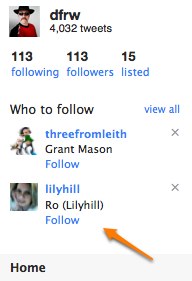Twitter Recommends Dead Friends
 On July 30th, Twitter announced that it was releasing a feature to recommend friends to follow right on the sidebar of the site when you log into Twitter.com. It was only a matter of time before their Who to Follow algorithm turned up someone who had passed away.
On July 30th, Twitter announced that it was releasing a feature to recommend friends to follow right on the sidebar of the site when you log into Twitter.com. It was only a matter of time before their Who to Follow algorithm turned up someone who had passed away.
My friend Dean Whitbread, @dfrw, alerted me this morning that upon logging in and seeing this feature for the very first time, he was disturbed to see his friend Ro, @lilyhill, recommended as someone to follow. She had died unexpectedly of a stroke in May 2009. Two days later, Ro’s daughter used her mom’s cell phone to text a last message to the account to notify @lilyhill’s friends of her passing.
Facebook does it too
This same problem has been on Facebook since they rolled out their Suggested Friends feature in March 2008. And automated friend recommendations without the context of whether the person is alive or dead is the source of one of the most frequent complaints that I hear about Facebook.
However, in Facebook, users have the ability to report a user deceased and memorialize their account. A memorialized account removes some personal information, prevents new friend requests and still allows existing friends to post messages to the deceased’s Wall. It also removes the user’s account from the “Suggested Friends” algorithm so that your dearly departed does not appear there.
Twitter’s deceased policy
Twitter has no such ability to deal with the deceased’s account. In fact, Twitter has no policy regarding the death of a user at all. The closest they have is an inactive accounts policy which states “Accounts may be removed from the site due to prolonged inactivity,” which they consider to be six-months. The policy then goes on to say they’re working on a way to release these accounts in bulk, but that they have no time line for when this might happen.
The account of the first person I knew on Twitter to pass away, @mochant, in December of 2007, is still there, well past the six-months to be considered an inactive account on Twitter.
The human side of the equation
Speaking to Dean Whitbread this morning about his friend @lilyhill, he remarked “we felt like family.” After her death in May 2009, he wrote blog post about Ro as a way to acknowledge his grief and pay tribute to his friend whom he’d known online for 18- months.
A comment on that post left by @Otir, another of Ro’s online friends, talked about how she was grieving online.
“I am still feeling bereaved, probably because unlike if we were close blood family, I haven’t been actually able to pay my respects and attend her funeral or say goodbye in a proper way, I guess writing a tribute for a friend we met online is the proper way to do it.
I miss Ro a lot. She had become part of my daily life because we had often the same twitting hours and moments. Her absence is felt by this online silence that captures the exact essence of what death can be: silence.”
When we chatted this morning about seeing Ro in the Who to Follow box, Dean expressed how seeing her avatar there reminded him of the grief and loss he felt, and made him miss @lilyhill all over again. He summed up his feelings about the impact online friendships in his memorial blog post 15-months ago:
“It’s not just the convenience of messaging, adding a follower, the ubiquity of the internet – it is the meeting of minds, the touching of souls, the shared sensibilities, the humour, the wisdom, the kindness and the love. Don’t believe it when they tell you that internet friendships are not real.”
Sadly, online social networks using algorithms to build connections between users fail to take into consideration the real human emotion of what that means to people when those connections are lost.
Update #1: I was reminded that LinkedIn also has this practice of recommending people who have passed away.
Update #2: (via @SuzanneLong) Matt Haughey, (@mathowie) lamented, “Not you too Twitter? Facebook did this on every login. Developers: add status field of “deceased” in your apps.”
It drew this response from Doug Bowman (@stop), Twitter’s Creative Director, “@mathowie Sorry, Matt. We know this is an issue. We’re looking at solutions that preserve the profile yet keeps the user out of suggestions.”
Doug Bowman, himself, has had a run in with this issue when he commented last December, “LinkedIn keeps suggesting I add a dear friend who died last year. We (social media) still fail to handle this gracefully.”
Update #3: Here are more cases of people being recommended deceased people to follow: @GeoShore @croyle @apogeum @BigToys
Update #4: After sending a tweet to @stop about the issue and a request to speak with someone at Twitter, I received a reply that he had passed this post on to the support team dealing with the topic. Inroads…


